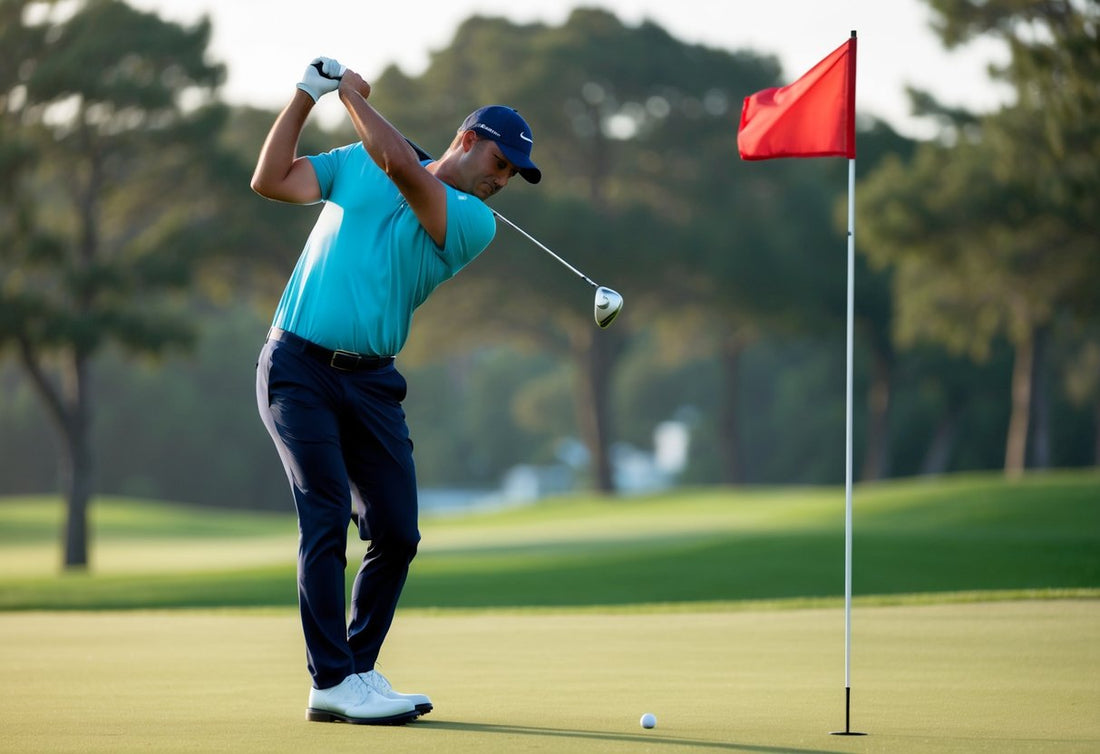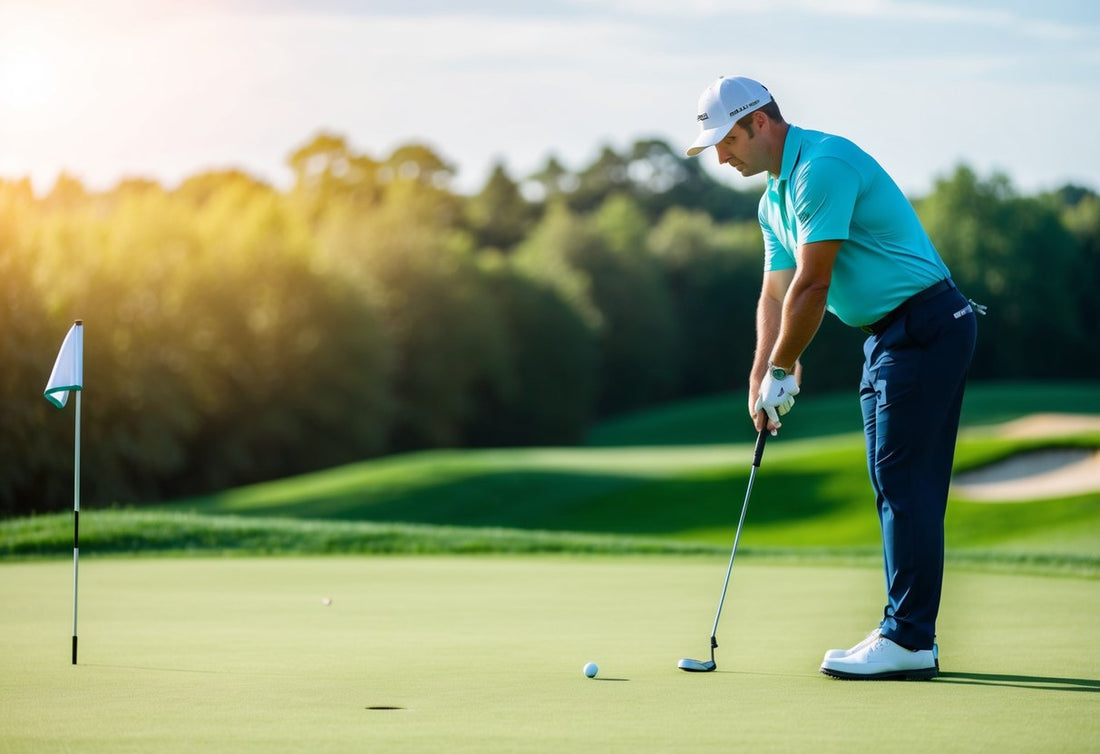Check out our golf rangefinders by Vovex to elevate your game!
Playing 18 holes of golf is a favorite pastime for many enthusiasts. We love the challenge, the fresh air, and the camaraderie that comes with a round of golf. But how long does it actually take to complete a full game?
For two players, a round of 18 holes typically takes between 3.5 to 4.5 hours. This timeframe can vary depending on several factors, including the players' skill levels, course difficulty, and overall pace of play.
We find that understanding the expected duration helps us plan our day better and enhances our enjoyment of the game. It's important to remember that golf is meant to be a leisurely sport, but maintaining a good pace keeps the experience enjoyable for everyone on the course.
Key Takeaways
- A round of golf for two players usually lasts 3.5 to 4.5 hours
- Player skill and course difficulty significantly impact game duration
- Maintaining a good pace enhances the golfing experience for all
Understanding the Game of Golf
Golf is a sport that challenges both body and mind. We play it on specially designed courses with 18 holes spread across picturesque landscapes.
Each hole presents a unique challenge, with varying distances and obstacles. Our goal is to hit the ball from the tee into the hole using as few strokes as possible.
A typical set of golf clubs includes:
- Drivers
- Irons
- Wedges
- Putters
We use different clubs for different situations, depending on the distance to the hole and the terrain.
Scoring in golf is straightforward. The player with the lowest total number of strokes at the end of 18 holes wins. Par is the standard number of strokes expert golfers are expected to take on each hole.
Golf etiquette is crucial. We maintain a respectful atmosphere on the course, keeping noise to a minimum and repairing any damage to the turf.
Weather plays a significant role in our game. Wind, rain, and temperature can all affect how we play and how the ball behaves.
Golf requires a combination of physical skill, strategy, and mental focus. We must consider factors like wind direction, slope of the green, and hazards when planning each shot.
Basics of Golf Scoring
Golf scoring can seem complex at first, but it's quite straightforward once you understand the basics. We'll break it down for you in simple terms.
In golf, the goal is to complete each hole in the fewest number of strokes possible. Every course has a "par" for each hole, which is the expected number of strokes for a skilled golfer.
Here's a quick overview of common par values:
- Par 3: Short holes
- Par 4: Medium-length holes
- Par 5: Long holes
When we finish a hole, we compare our score to par:
- Birdie: 1 stroke under par
- Par: Exactly par
- Bogey: 1 stroke over par
As we play, we keep a running total of our strokes. At the end of 18 holes, we add up all our scores. The player with the lowest total wins the round.
Some fun scoring terms to know:
- Eagle: 2 strokes under par
- Albatross: 3 strokes under par (rare!)
- Hole-in-one: Completing a hole in just one stroke
Remember, golf is about enjoying the game and improving our skills. Whether we're shooting under par or just starting out, the most important thing is to have fun on the course!
Factors Affecting Duration
We've found several key elements that influence how long it takes to play 18 holes with two players. Let's explore these factors:
Skill Level: Experienced golfers typically play faster than beginners. We've noticed that pros can finish in about 3 hours, while novices might take up to 5 hours or more.
Course Difficulty: Challenging courses with hazards, rough terrain, and complex layouts slow down play. We've seen easier courses allow for quicker rounds.
Tee Time Intervals: The spacing between groups impacts pace. When tee times are too close together, we often encounter bottlenecks and delays.
Walking vs. Cart: Using a golf cart can speed up play, especially on courses with long distances between holes. We've observed walking can add 30-60 minutes to a round.
Course Traffic: Busy days mean more waiting. We've experienced significant slowdowns during peak times and weekends.
Weather Conditions: Wind, rain, or extreme temperatures affect play speed. We've found adverse weather can extend a round by an hour or more.
Group Size: While we're focusing on two players, it's worth noting that larger groups generally take longer to complete 18 holes.
By considering these factors, we can better estimate our playing time and plan accordingly for a day on the links.
Average Time to Play 18 Holes
Playing 18 holes of golf typically takes between 3.5 to 4.5 hours for two players. The duration can vary based on several factors, including the use of a golf cart or walking the course.
With a Golf Cart
Using a golf cart can significantly speed up a round of golf. We've found that two players using a cart usually complete 18 holes in about 3.5 to 4 hours. Golf carts allow quick travel between shots and holes, reducing walking time.
Factors affecting play speed with a cart include:
- Course layout and terrain
- Player skill levels
- Course traffic and waiting times
Even with a cart, it's crucial to maintain a steady pace and be considerate of other golfers. We recommend being ready to play when it's your turn and keeping up with the group ahead.
Walking the Course
Walking 18 holes generally takes longer than using a cart. Two players on foot typically complete a round in 4 to 4.5 hours. This method offers a more traditional golfing experience and provides excellent exercise.
Key points for walking golfers:
- Maintain a brisk pace between shots
- Use a push cart to ease the burden of carrying clubs
- Stay hydrated, especially in warm weather
Walking can add about 30 minutes to your total play time compared to using a cart. However, many golfers prefer this method for its health benefits and the opportunity to fully appreciate the course's beauty.
Pace of Play Tips
We've got some helpful tips to keep your golf game moving smoothly. Staying ready to play is key. When it's your turn, be prepared with the right club in hand.
Playing "ready golf" can speed things up. This means hitting when you're ready, as long as it's safe to do so. No need to strictly follow the "furthest from the hole goes first" rule.
Keep an eye on your ball's flight path. Watching closely helps you find it quickly, saving precious minutes searching.
Try to limit practice swings to one or two. Too many can slow down the whole group.
Here are some quick pointers to remember:
- Place your bag on the side of the green closest to the next tee
- Mark your scorecard at the next tee, not on the green
- If you're unsure if your ball is lost, hit a provisional ball
Walking briskly between shots keeps the pace up. If using a cart, drop your partner off at their ball before heading to yours.
Limit conversations to when you're walking or riding. Save the longer chats for after the round.
By following these tips, we can all enjoy a faster, more enjoyable round of golf.
Golf Etiquette for Speedy Play
We golfers know the importance of keeping a good pace on the course. Let's explore some key etiquette tips to help speed up play and enhance everyone's experience.
Be ready when it's your turn. While waiting for others to hit, we can plan our shots and select our clubs. This small step can save precious minutes throughout the round.
Play "ready golf" when appropriate. In non-competitive rounds, it's fine to hit out of turn if you're ready and it's safe to do so.
Limit practice swings to one or two. Too many practice swings slow down the game and often don't improve our shots.
Keep an eye on each other's balls. Helping our playing partner locate their ball can significantly reduce search time.
Park carts and bags strategically: Position them on the side of the green closest to the next tee. This allows us to exit quickly after finishing the hole.
Mark scores at the next tee, not on the green. This simple habit keeps the group behind us moving.
Consider playing from shorter tees if struggling. It's okay to move up - we'll enjoy the game more and maintain a better pace.
Best Times to Play for Quicker Rounds
Early mornings offer the fastest rounds for golf enthusiasts. We recommend teeing off between 6:30 AM and 8:00 AM when courses are least crowded. The crisp air and freshly manicured greens provide an ideal start to the day.
Weekdays typically see fewer players than weekends. Tuesday through Thursday mornings are prime times for speedy play. We've found that most courses have ample tee time availability during these periods.
Late afternoons can also yield quicker rounds. After 3:00 PM, many golfers have finished their games, leaving the course open. This time slot works well for those with flexible schedules.
Off-season play often results in faster rounds. Cooler months see fewer golfers braving the elements. We suggest bundling up and taking advantage of the open fairways.
Some courses offer twilight rates in the evening. These discounted times often come with less crowded conditions, perfect for a brisk 18 holes.
Here's a quick reference for optimal play times:
- Weekday mornings (6:30 AM - 8:00 AM)
- Late afternoons (After 3:00 PM)
- Off-season months
- Twilight hours
By choosing these strategic times, we can enjoy our rounds without the frustration of slow play.
Golf Course Design Influence
Golf course layouts can significantly impact the time it takes to play 18 holes. We've found that factors like hole length, hazard placement, and overall course routing all play a role.
Longer holes naturally require more time to complete. Par 5s and lengthy par 4s often add extra minutes to a round compared to shorter par 3s.
The positioning of bunkers, water hazards, and rough areas affects play speed too. More obstacles mean more potential for lost balls and difficult shots, potentially slowing down the game.
Course routing is another key factor. Some designs have long walks between holes or confusing layouts that can add unnecessary travel time. Well-designed courses minimize these issues.
Here are some design elements that tend to speed up play:
- Wide fairways
- Fewer hazards
- Short distances between greens and next tees
- Clear signage and navigation
On the flip side, these features often slow things down:
- Narrow fairways
- Abundant water hazards
- Excessive bunkering
- Blind shots
We've noticed newer courses often prioritize playability and flow to help maintain a reasonable pace of play. This focus on efficient design can shave valuable minutes off a round.
Impact of Player Skill Level
When it comes to playing 18 holes of golf, skill level plays a crucial role in determining how long the round will take. We've noticed that beginners typically require more time than experienced players.
Novice golfers often spend extra minutes: • Searching for lost balls • Taking more shots per hole • Analyzing their stance and swing
Experienced players, on the other hand, tend to move through the course more efficiently. They're familiar with proper etiquette and pace of play expectations.
Here's a rough estimate of time differences based on skill level:
| Skill Level | Average Time for 18 Holes |
|---|---|
| Beginner | 4.5 - 5.5 hours |
| Intermediate | 4 - 4.5 hours |
| Advanced | 3.5 - 4 hours |
It's important to note that these times can vary depending on course difficulty and other factors. We've found that mixed skill levels in a group can also impact the overall pace.
What's the average pace of play for a duo on an 18-hole golf round?
A typical twosome usually completes 18 holes in about 3.5 to 4 hours. This pace allows for a relaxed game without rushing. Most golf courses expect this timeframe for a duo.
Can a twosome complete 18 holes within two hours?
It's possible but rare for a twosome to finish 18 holes in two hours. This would require both players to be highly skilled, familiar with the course, and playing at a very brisk pace. We don't recommend rushing, as it can diminish enjoyment.
What factors influence the duration of a round of golf for two players?
Player skill level significantly affects round duration. Course difficulty, length, and layout also play roles. Weather conditions and course traffic can impact play time. Group size ahead and behind can influence pace as well.
How does walking versus using a cart affect the time taken for a pair to play 18 holes?
Using a golf cart typically speeds up play by 30 minutes to an hour compared to walking. Carts allow quicker travel between shots and holes. However, some players prefer walking for exercise and find it doesn't significantly slow their game.
Is there a difference in playtime for 18 holes between beginners and experienced golfers in a twosome?
Experienced golfers generally complete rounds faster than beginners. They often take fewer shots and spend less time searching for balls or deciding on club selection. Beginners may add an hour or more to round times.
What are effective ways to speed up play for two golfers on an 18-hole course?
Being prepared for each shot speeds up play. Playing "ready golf" where the ready player hits first helps too. Limiting practice swings and promptly moving to the next tee after finishing a hole are effective time-savers.






